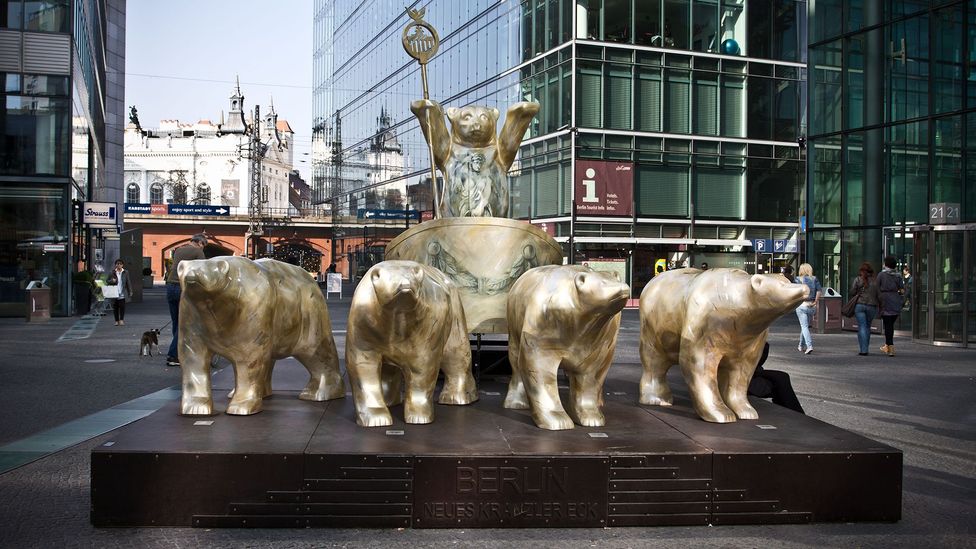Germans Mixing Up Fun and Funny
Why people think Germans aren't funny
(Image credit:
ES Germany/Alamy
)

If the Germans have always had a funny bone in them, just how did this unfortunate stereotype come about?
T
Tears of laughter trickled down my face and I clapped so hard my hands turned red. But I was surprised at my reaction, for I was being hilariously entertained by a German comedian at Quatsch Comedy Club in Berlin, in a situation that could be considered oxymoronic by many.
The Germans obviously appreciate a show of good humour, a fact made evident with the soaring popularity of these comedy venues in Berlin. In fact, comedy has deep roots in German culture, with a strong appreciation of political satire as well as physical slapstick. Yet the Germans were voted in a 2011 survey by Badoo.com to be the least funny nationality, reinforcing a well-known stereotype of Germans having no humour.

It's a well-known stereotype that Germans have no humour (Credit: ES Germany/Alamy)
You may also be interested in:
– Why are Australians so laid back?
– The confusing way Mexicans tell time
– Why Italian sounds so seductive
"I'd never known about that stereotype. I only found out by speaking to English-speaking people," Nicole Riplinger, an English and French teacher from Saarbrücken, told me. "I don't think we consider ourselves to be humourless."
"I definitely love humour," she added, "especially involving irony and socio-critical issues."
What she's describing has a long tradition in Germany, where the use of political and social taboos as basis for comedy are typical of the satirical talk shows and kabarett TVprogrammes, which are similar to today's variety shows but heavy with political satire.
So, if the Germans have always had a funny bone in them, just how did this unfortunate stereotype come about?

The way different languages are constructed can affect the way various cultures deliver and perceive jokes (Credit: Ullstein Bild/Getty Images)
Nicola McLelland, German linguistics professor at the UK's University of Nottingham, believes that the way different languages are constructed can affect the way various cultures deliver and perceive jokes.
She explained that humour commonly uses ambiguity in word interpretation and sentence construction to create alternative meanings, which can add comical elements to a situation. For example, the phrase 'we saw her duck' has a dual meaning: either that we saw a duck that belonged to her, or we saw her in the act of ducking away from harm.
However, German's language construct can be very different. Nouns can have three different genders and four different cases. Verbs also have a lot of different forms. The exact meaning of a sentence relies on the correct use of gender and case pertained to the eventual meaning, affecting how humour can be delivered. Basically, it's harder to pun in German when the grammar makes things so much less ambiguous.

Jokes using compound words, such as this one, meaning 'embarrassing place', are hard for foreigners to understand (Credit: Shotshop GmbH/Alamy)
But what the German language does have, however, is the ability to create compounds.
German is one of the few languages where the use of compound words – words made up of multiple individual words, such as schadenfreude, which puts together schaden (harm) and freude (pleasure) – is common. Compound words often can't be directly translated into other languages, so jokes made with compound words simply won't be funny to non-German speakers.
Professor McLelland explained this to me with an example of a commonly told joke:
"Why can't you pick up your watch if you've dropped it? Because no Urheberrecht."
She explained that Urheberrecht means 'copyright' – but German has another very similarly pronounced compound word – Uhreberrecht – which has a literal meaning of 'watch-pickup-right'. When spoken aloud, it's the dual implication that results in a comical effect.
See how this joke just doesn't work in English? In fact, this ability of the German language to be extremely concise perhaps explains why even a good German speaker of English might sound a bit overly precise in English – which can add to the impression that Germans are more earnest than funny.

German culture is centred around a strong appreciation of political satire and physical slapstick culture (Credit: grzegorz knec/Alamy)
Christian Baumann, a lawyer from Nuremberg whose travels have exposed him to different cultures around the world, agrees that language differences play a huge part in Germany's unfunny stereotype.
On one of his first foreign trips to the United States, he constantly had to translate his thoughts from German into English, even when telling a joke. The result was that people just didn't get him. Some went as far as accusing his directness of speech to be rude.
"I think when you try to speak with a literal translation from German to English, you lose a lot of meaning that makes a joke funny. And when you have to explain a joke, it just isn't funny anymore," Baumann said. "So naturally, they didn't think I was funny."
But he also thinks that cultural variances play a big part, too.
"In English, you are always very polite, even if you are criticising something. But German is different. We will say what we have in mind, so, naturally I think, the English speakers have the impression that Germans are only logical, rude (but very good engineers) and can't have fun," Baumann said.

Comedy venues have become increasingly popular in Berlin (Credit: INTERFOTO/ Alamy)
This is a sentiment German comedian Christian Schulte-Loh shares. Fully aware of the stereotype the Germans are labelled with, he writes in his new book, Zum Lachen auf die Insel (To England with Laughs), that Germans are too honest to be polite and the English are too polite to be honest.
But Schulte-Loh, who regularly performs at Quatsch Comedy Club in Berlin and tours internationally, says this particular stereotype actually serves him well during his routines. For example, when headlining a show at Top Secret Comedy Club in London in front of a sold-out crowd, he opened with a stab at his nationality.
"Hello, I am Christian and I am a German comedian!" He paused as the crowd jeered. "Oh I see the expectation is already dropping. That's ok, I can only try my best!"
Why We Are What We Are is a BBC Travel series examining the characteristics of a country and investigating whether they are true.
Join over three million BBC Travel fans by liking us on Facebook , or follow us on Twitter and Instagram .
If you liked this story, sign up for the weekly bbc.com features newsletter called "If You Only Read 6 Things This Week". A handpicked selection of stories from BBC Future, Earth, Culture, Capital and Travel, delivered to your inbox every Friday.
tunbridgerebt1953.blogspot.com
Source: https://www.bbc.com/travel/article/20170802-why-people-think-germans-arent-funny